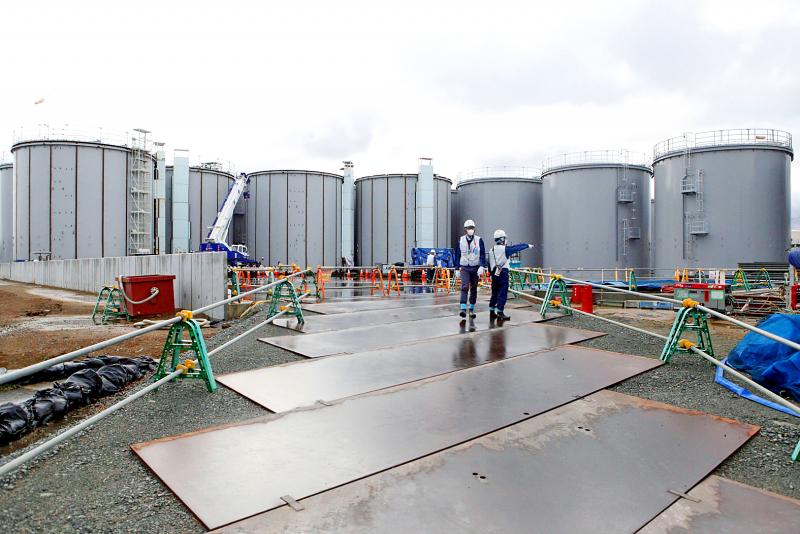Contaminated water that would reportedly be released into the sea from the wrecked Fukushima Dai-ichi nuclear power plant contains a radioactive substance that has the potential to damage human DNA, a Greenpeace investigation has said.
The environmental group said the 1.23 million tonnes of water stored in more than 1,000 tanks at the plant contains “dangerous” levels of the radioactive isotope carbon-14, in addition to quantities of tritium that have already been widely reported.
The publication of the report Stemming the Tide 2020: The reality of the Fukushima radioactive water crisis comes days after Japanese media reported that the government was close to giving its approval to release the water into the Pacific Ocean, despite objections from local fishers who say the move would destroy their livelihoods.

Photo: Reuters
“We cannot postpone the issue forever,” Japanese Prime Minister Yoshihide Suga said this week. “We would like to make a decision responsibly as soon as possible.”
While most attention has been focused on tritium — which cannot be removed by the on-site filtration system used by the plant’s operator, Tokyo Electric Power Co (TEPCO) — Greenpeace Japan and Greenpeace East Asia said that radioactive carbon in the stored water would also be discharged.
Carbon-14 has a half-life of 5,370 years and becomes “incorporated into all living matter,” the report said.
“It concentrates in fish at a level thousands of times higher than tritium. Carbon-14 is especially important as a major contributor to collective human radiation dose and has the potential to damage human DNA,” it said.
The Japanese government and TEPCO refer to the water — which becomes tainted when it is used to cool the plant’s tsunami-damaged reactors — as “treated water” and give the impression that it contains only tritium, it added.
TEPCO’S advanced liquid processing system removes highly radioactive substances from the water, but is unable to filter out tritium, a radioactive isotope of hydrogen that nuclear power plants routinely dilute and dump along with water into the ocean.
Greenpeace said that it had confirmed with TEPCO that the system was not designed to remove carbon-14.
“Nearly 10 years after the start of the disaster, TEPCO and the Japanese government are still covering up the scale of the crisis at Fukushima Dai-ichi,” said Shaun Burnie, author of the report and senior nuclear specialist with Greenpeace Germany.
“They have deliberately held back for years detailed information on the radioactive material in the contaminated water. They have failed to explain to the citizens of Fukushima, wider Japan and to neighboring countries such as South Korea and China that the contaminated water to be dumped into the Pacific ocean contains dangerous levels of carbon-14,” Burnie said.
“These, together with other radionuclides in the water will remain hazardous for thousands of years with the potential to cause genetic damage. It’s one more reason why these plans have to be abandoned,” he added.
Japan’s government is expected to announce a decision on the water’s fate next week.
Media reports said that the project would begin in 2022 at the earliest and take decades to complete.
The water at Fukushima Dai-ichi would be diluted inside the plant before it is released so that it is 40 times less concentrated, the Yomiuri Shimbun said.
Pressure for a decision has been building as storage space on the nuclear plant site shrinks, with TEPCO estimating all of the available tanks would be full by the middle of 2022.

US PUBLICATION: The results indicated a change in attitude after a 2023 survey showed 55 percent supported full-scale war to achieve unification, the report said More than half of Chinese were against the use of force to unify with Taiwan under any circumstances, a survey conducted by the Atlanta, Georgia-based Carter Center and Emory University found. The survey results, which were released on Wednesday in a report titled “Sovereignty, Security, & US-China Relations: Chinese Public Opinion,” showed that 55.1 percent of respondents agreed or somewhat agreed that “the Taiwan problem should not be resolved using force under any circumstances,” while 24.5 percent “strongly” or “somewhat” disagreed with the statement. The results indicated a change in attitude after a survey published in “Assessing Public Support for (Non)Peaceful Unification

The CIA has a message for Chinese government officials worried about their place in Chinese President Xi Jinping’s (習近平) government: Come work with us. The agency released two Mandarin-language videos on social media on Thursday inviting disgruntled officials to contact the CIA. The recruitment videos posted on YouTube and X racked up more than 5 million views combined in their first day. The outreach comes as CIA Director John Ratcliffe has vowed to boost the agency’s use of intelligence from human sources and its focus on China, which has recently targeted US officials with its own espionage operations. The videos are “aimed at

‘MISGUIDED EDICT’: Two US representatives warned that Somalia’s passport move could result in severe retaliatory consequences and urged it to reverse its decision Minister of Foreign Affairs Lin Chia-lung (林佳龍) has ordered that a special project be launched to counter China’s “legal warfare” distorting UN Resolution 2758, a foreign affairs official said yesterday. Somalia’s Civil Aviation Authority on Wednesday cited UN Resolution 2758 and Mogadishu’s compliance with the “one China” principle as it banned people from entering or transiting in the African nation using Taiwanese passports or other Taiwanese travel documents. The International Air Transport Association’s system shows that Taiwanese passport holders cannot enter Somalia or transit there. The Ministry of Foreign Affairs (MOFA) protested the move and warned Taiwanese against traveling to Somalia or Somaliland

Four former Hong Kong opposition lawmakers jailed in the territory’s largest national security case were released yesterday after more than four years in prison, the first among dozens convicted last year to regain their freedom. Former legislators Claudia Mo (毛孟靜), Jeremy Tam (譚文豪), Kwok Ka-ki (郭家麒) and Gary Fan (范國威) were part of a group of 47 public figures — including some of Hong Kong’s best-known democracy advocates — who were charged with subversion in 2021 for holding an informal primary election. The case fell under a National Security Law imposed on the territory by Beijng, and drew international condemnation and warnings